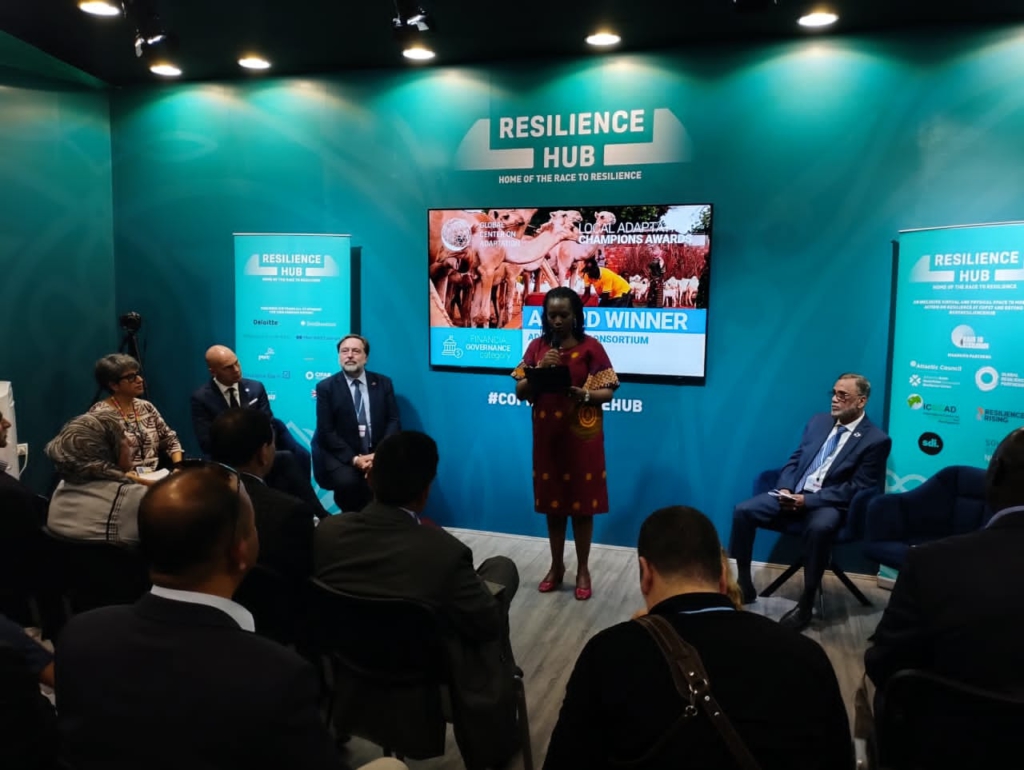The Global Center on Adaptation (GCA) has recognized four community-led organizations for their pioneering work in leading climate change adaptation for vulnerable local communities.
Many dignitaries attended yesterday’s event at the COP27 climate summit in Egypt, recognizing the significance of the recognition.
In four categories, the awards recognize locally led efforts to adapt to the negative effects of climate change: financial governance, inclusive leadership, capacity and knowledge, and local innovation.
Each winner will receive €15,000 in funding to support their work in accordance with the principles of locally led adaptation, as well as access to a global network of changemakers.
JoyNews Mahmud Mohammed-Nurudeen, who monitored the ceremony said, the final list of winners, chosen from a shortlist of 20 finalists, includes organizations from Kenya, Bangladesh, India, and Nepal.
The financial governance category was awarded to Kenya’s Adaptation Consortium, which assists communities in creating, accessing, and using climate finance from various sources to reduce their vulnerability to climate change while strengthening public participation in fund management and use.
The Consortium has also created a County Climate Change Fund to attract climate finance from public, private, local, and international sources, providing subnational governments and communities with a predictable and long-term source of funding for adaptation and resilience efforts.

According to Victor Orindi, National Coordinator of the Adaptation Consortium, while much was happening in climate finance, it was not happening in a coordinated manner. As a result, vulnerable communities were unable to access funds, which was the barrier they desired to overcome in order to sustain funding streams.
According to Victor, communities could not have a say in the work to be done, so they began bringing people together toward a shared vision, empowering the community.
“Responding and adapting to climate challenges largely depends on context; and the only way you can get that right is by ensuring that those who are impacted have a say in terms of how and where things are done. So, enabling them to be involved in planning process ensures that their voices count at the end of the day,” Orindi added.
Rangamati Hill District Council from Bangladesh is among the organizations that have received awards. They won the category of inclusive leadership. Through solar-powered safe water supply facilities and the provision of safe drinking water during crises, the Council collaborates with local communities to combat worsening droughts, landslides, and flash floods.
In addition, the Council established a climate resilience committee and assisted local communities in conducting climate vulnerability assessments, which informed the development of local resilience plans.
Public Relations Officer Arunendu Tripura notes that communities now have clean drinking water to water their dragon fruit, mango, and lychee orchards and cultivate their land for food and income.
“Also, half of our members are women. I asked them why they chose to install this water facility, and they said as soon as they were able decide a solution, they chose to end the misery they face in fetching water, to curb their suffering. This gave me great satisfaction,” he said.
Swayam Shikshan Prayog, an Indian non-governmental organization, won the capacity and knowledge category for their work in assisting women farmers in Maharashtra to adopt more resilient and sustainable agricultural practices, where a focus on water-intensive cash crops currently exposes farmers to climate shocks such as poor monsoon seasons.
The organization created a women-led Climate Resilient Farming model to assist farmers in transitioning from cash crops to food crops and from chemical to bio inputs, as well as in soil and water conservation and the promotion of more diverse and resilient livelihoods through farm-allied businesses.
According to the Director of Programs for the Swayam Shikshan Prayog organization, when women began telling them that they didn’t have food to eat, that’s when their agriculture work with them truly began.
“We were trying to ensure food security for the families first. Instead of focusing on kitchen and home gardens, the women grow food on the farm, eat from there, and do it in organic, water-efficient, and low-cost ways,” he said.
Farmers’ reliance on expensive chemical fertilizers, pesticides, and market-bought hybrid seeds has resulted in a significant increase in cultivation costs.
He said that in order to effect change, women must continually use their innate wisdom as family food and nutrition managers, which allows them to think critically.
The Forum has led the way in mobilizing local communities for natural resource conservation, watershed conservation, river system management, and degraded land rehabilitation in a flood-prone region of Nepal.
“Our intervention addresses the pressing issues associated with the livelihoods of the local community along the River basin from upstream Siwalik hills to downstream terai,” said Nagdev Yadav, President of the Community Development & Advocacy Forum Nepal.
Nagdev stated that because ground water is the only source of drinking water and irrigation for communities downstream, rehabilitation efforts further upstream improve erosion and sedimentation control while also making water available for people downstream.
“From mango, litchi, lemon and papaya to vegetables, degraded and dry riverbanks have been turned into green areas immediate and long-term income has been ensured to the landless and smallholders, benefitting more than 10,000 households. Before people had to dig or go far away to find drinking water. Now, communities have witnessed the results themselves: from growing only rice in one year, now they can grow maize, wheat, vegetables and fruits and they have seen the benefits on their nutrition and harvests.”
The award winners were selected by a prestigious jury, comprised by Rania A. Al Mashat, Minister of International Cooperation of the Arab Republic of Egypt, Professor Patrick V. Verkooijen, Chief Executive Officer of the Global Center on Adaptation, Saima Wazed Putul, Thematic Ambassador for Vulnerability of The Climate Vulnerable Forum, Sheela Patel, Director of the Society for Promotion of Area Resource Centres and Ban Ki-moon, Chair of the Global Center on Adaptation Board and 8th Secretary-General of the United Nations.
“Our winners show that community-centric and locally led solutions to the climate crisis exist, but they require support and recognition to be scaled up, and to achieve the most impact,” Professor Patrick Verkooijen, Chief Executive Officer of the Global Center on Adaptation.
According to Professor Verkooijen, the GCA is collaborating with international financial institutions and governments to incorporate these best practices into larger funding streams, while maintaining what is at the heart of these impactful solutions and successful adaptation – local leadership.





